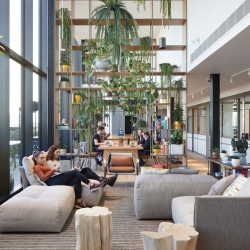March 6, 2024
Hybrid working helps women into senior management roles
 The widespread adoption of hybrid working has opened the door for women to apply for senior positions within their companies, according to a new report released ahead of International Women’s Day. IWG’s 2024 report Advancing Equality: Women in the Hybrid Workplace, based on research among more than 1,000 female hybrid workers, found that flexible working had allowed over half (53 percent) to pursue promotions or apply for more senior roles – which, in an encouraging move for advancing equality, rises to more than three in five (61 percent) of women from minority backgrounds. For almost three quarters (73 percent) of women in minority groups, flexible working has opened up new opportunities that they would not have had otherwise. (more…)
The widespread adoption of hybrid working has opened the door for women to apply for senior positions within their companies, according to a new report released ahead of International Women’s Day. IWG’s 2024 report Advancing Equality: Women in the Hybrid Workplace, based on research among more than 1,000 female hybrid workers, found that flexible working had allowed over half (53 percent) to pursue promotions or apply for more senior roles – which, in an encouraging move for advancing equality, rises to more than three in five (61 percent) of women from minority backgrounds. For almost three quarters (73 percent) of women in minority groups, flexible working has opened up new opportunities that they would not have had otherwise. (more…)

























 According to
According to 








February 28, 2024
The hybrid working office: ushering in a new era for the workspace
by Jeni Taylor • Comment, Flexible working, Workplace design